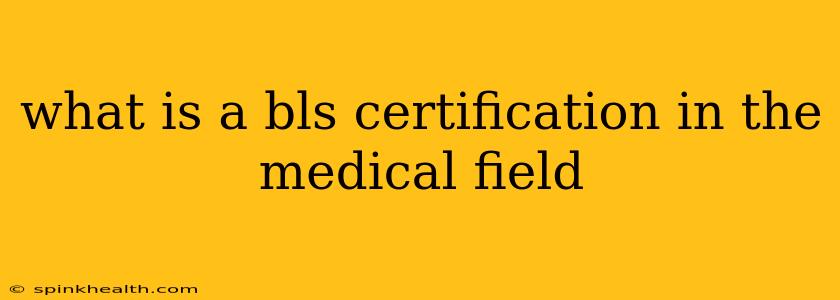What is a BLS Certification in the Medical Field? A Lifesaving Skill
The world of healthcare is filled with specialized certifications, each signifying a commitment to a specific area of expertise. One such certification, vital in many medical settings, is BLS – Basic Life Support. But what exactly is a BLS certification, and why is it so crucial? Let's dive in.
Imagine this: You're working in a hospital cafeteria when you hear a sudden commotion. A patient has collapsed, unresponsive. Seconds feel like minutes. Knowing what to do – and doing it effectively – could mean the difference between life and death. This is where BLS training steps in.
BLS certification isn't just a piece of paper; it's a testament to your ability to provide immediate and potentially life-saving care in a medical emergency. The certification proves you've received training in recognizing and responding to cardiac arrest, breathing difficulties, and other life-threatening situations. It's the foundation upon which many other advanced medical certifications are built.
What Skills Does BLS Certification Cover?
BLS certification encompasses a range of critical skills, all designed to equip medical professionals and even laypeople with the ability to respond effectively in a crisis. These skills typically include:
-
Recognizing and responding to a cardiac arrest: This includes checking for responsiveness, activating the emergency response system (often by calling 911 or your internal emergency code), and initiating chest compressions and rescue breaths (CPR). The techniques used are meticulously detailed during training to maximize their effectiveness.
-
Providing high-quality chest compressions: The force, depth, and rate of compressions are crucial to sustaining circulation until advanced medical help arrives. BLS training emphasizes the correct technique to ensure maximum impact.
-
Administering rescue breaths: Knowing how to provide rescue breaths – effectively delivering oxygen to the victim – is a key component of BLS. This can be a challenging aspect of the training, but it's essential for successful resuscitation.
-
Using an Automated External Defibrillator (AED): Many BLS courses include training in the safe and proper use of an AED, a device that can analyze a patient's heart rhythm and deliver an electrical shock to restore a normal heartbeat. This life-saving technology is often a critical part of the rescue effort.
-
Understanding and recognizing other emergencies: BLS training goes beyond cardiac arrest; it often includes training on recognizing and responding to choking, severe allergic reactions, and other serious medical situations. This holistic approach prepares you for a range of potential emergencies.
How Long is a BLS Certification Valid For?
The validity period for a BLS certification varies depending on the certifying organization (American Heart Association, American Red Cross, etc.) but generally ranges from one to two years. After this period, you'll need to renew your certification through a recertification course, typically involving a skills assessment and a written or online exam. This ongoing training ensures that healthcare professionals stay up-to-date on the latest best practices and techniques.
What Are the Benefits of Getting BLS Certified?
The benefits extend far beyond just having the certification itself. The knowledge and skills you gain are invaluable, potentially saving lives both in professional and personal settings. Plus:
-
Increased Employability: BLS certification is a highly sought-after credential in many healthcare settings. It demonstrates your commitment to patient safety and is often a requirement for employment in various medical roles.
-
Enhanced Confidence: Knowing you're prepared to handle a medical emergency builds confidence in yourself and your ability to assist those in need.
-
Personal Satisfaction: There's immense personal fulfillment in knowing you have the skills to make a difference in someone's life during a critical moment.
Who Needs BLS Certification?
BLS certification is beneficial for a wide range of individuals, including:
-
Healthcare professionals: Nurses, doctors, paramedics, EMTs, and other medical staff often require BLS certification as part of their job requirements.
-
First responders: Police officers, firefighters, and other first responders frequently use BLS skills in emergency situations.
-
Lifeguards: BLS is a standard requirement for lifeguards and other individuals who work in aquatic environments.
-
Childcare providers: Knowing BLS can be crucial in childcare settings, allowing swift response in case of an emergency.
BLS certification is more than just a credential; it's a vital skill that empowers individuals to make a profound difference in the lives of others. It's a commitment to preparedness and a testament to the dedication to providing essential life support when it matters most.

